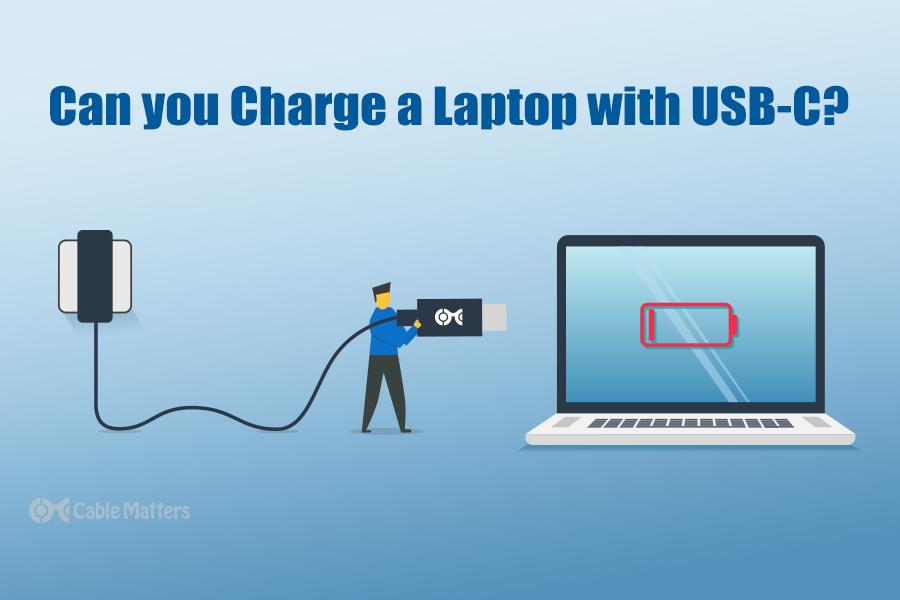
USB chargers have been a staple of smaller electronic devices for years, from MP3 players to smartphones, but laptops have traditionally required bulkier power cables to get the job done. USB connections just didn't have the power to charge larger devices, like laptops. But USB-C changed that. Can you charge a laptop with USB-C? Absolutely! Not every laptop, but for those that feature a USB-C connection, there's a good chance you can use that port to charge your laptop with and all you need is the right cable for the job.
USB power explained
When USB Implementers Forum introduced the USB Battery Charging 1.2 standard in the early 2010’s, it was focused on more traditional USB-A and USB-B connectors. It built atop existing USB standards, which would allow a USB cable to operate as a dedicated charging port, or a charging port with data. Traditional USB ports would only be able to handle 2.5W (USB 2.0), 4.5W (USB 3.0), or 7.5W (USB Battery Charging 1.2) of charging power, and thus were only useful to charge smaller devices like phones or tablets. However, a laptop needs considerably more than that to charge effectively.
It wasn't until USB Power Delivery was revised in version 2.0 that it became a far more viable standard for charging devices. Along with both USB 3.1 specifications (for faster data transfer) and USB-C port and cables, it also introduced a number of new features.
So, while traditionally USB connections have been relegated to charging smaller devices, today they can charge much more power-hungry devices, like laptops. That's why people still wonder, can you charge a laptop with USB-C? Because it still feels a little odd to use what is traditionally a data-only connection on laptops to provide power.
How to charge a laptop with USB-C
If your laptop came with a USB-C charger, then that's the best way to get it powered up. It will likely have a power brick that connects to a USB-C cable, which then, in turn, plugs into a port on your laptop. The power you choose doesn't necessarily matter, but some laptops come with dedicated USB-C charging ports, so looking at your model's manual, or at an online guide to your laptop, can be a great way to find out the best way to charge it. Standard USB-C cables are rated to charge at 60W and cables with a special “electronic marker” are rated for charging up to 100W. USB-C chargers will vary but will be labeled with their capabilities.
That's also the best place to learn the power requirements and limitations of your laptop, should you ever need to replace the USB-C cable with one of the ones that Cable Matters sells.
If your laptop has a charger with the coaxial power connect (barrel connector), it may not feature USB-C charging, even if it has a USB-C port or two on its chassis. In other cases, you can use either option. Modern devices like the Samsung Notebook 9, or the 2019 model of the HP Envy 13 both have dedicated chargers and USB-C ports that you can charge with; although you will typically get a faster charge from using the dedicated charger.
Charging speed can also be affected by the Power Delivery method used by your particular laptop, and by the charger you're using with it. Some support higher wattages and amperages, which tend to lead to faster charging. For example, the 15 inch MacBook Pro utilizes USB-C charging at 87W while many smaller Chromebooks charge only at 30 or 45W.
Can you charge a laptop with USB-C through a hub?
Yes! Although you can charge a laptop with USB-C using a dedicated cable and power brick, there are also other ways to do it. One of the most popular methods is through a docking station. These can provide laptops with not only a USB-C charging opportunity, but a greater array of ports and connections. With the way many modern laptops are designed to be slim, streamlined devices, they can sometimes lose out on port variety and abundancy. USB-C docking stations can change that. There are also a number of portable docking stations or multiport adapters that support USB-C charging.
If this has got you wondering, can you charge a laptop with USB-C through a monitor, you're asking the right questions. USB-C monitors not only help keep your desk tidy because they can use a singular cable for power and data, but they can also be useful for charging your other devices, smartphones and laptops included.
USB-C is one of the best connection for most consumer electronics
USB-C is one of the most versatile connectors, offering data transfer, video transmission, and charging capabilities, all in one standard. It's no wonder it forms the basis of the latest generation of the Thunderbolt standard and is set to be the basis for future USB 4.0 standards.
Can you charge a laptop with USB-C? Absolutely. If your laptop has a USB-C port, you can almost certainly charge it with it. The same goes for your phone, and any other compatible USB-C device. It's a fantastic port. The fact that it's reversible is just icing on the cake.